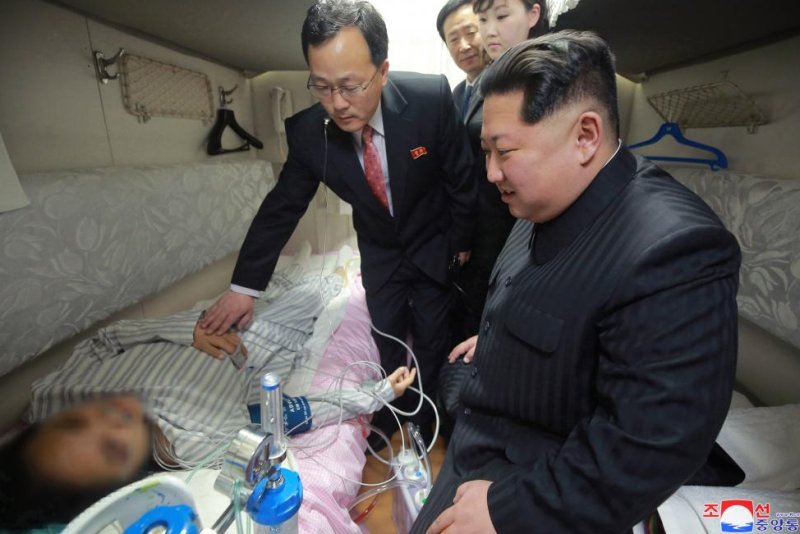A photo released Thursday by North Korea's Central News Agency shows North Korean leader Kim Jong Un (R) visiting the Pyongyang Railway Station in Pyongyang, North Korea to check on Chinese survivors of a recent bus crash in North Korea. Kim is to meet with South Korean President Moon Jae-in on Friday. Photo courtesy of KCNA
NEW YORK, April 26 (UPI) -- North Korea's strategy has remained remarkably consistent despite perceptions the Kim Jong Un regime is turning a new leaf ahead of a historic summit on Friday, according to defectors in the South who spoke to UPI.
The defectors said that while they, like other South Koreans, are hopeful for a positive outcome to the summit between South Korean President Moon Jae-in and Kim, North Korea is entering the meeting from a position of strength cultivated across generations.
Ken Eom, 37, a former Korean People's Army soldier who fled the regime in 2010, told UPI by phone that Pyongyang's grand strategy has not fluctuated with changing times.
In North Korea, he and others were instructed by then-leader Kim Jong Il to "tighten their belts" so the regime could pour its resources into the development of nuclear weapons.
"Some people say North Korea is negotiating because of [threats from] U.S. President Donald Trump," Eom said. "But I don't see it that way."
Eom added Kim has "never" deviated from the foreign policy of his father.
"In Kim Jong Il's time, we were told even if we need to tighten our belts, or even if there is nothing to eat, we must first develop nuclear weapons," Eom said. "Then, without recourse, the economy would be developed upon the foundation of nuclear power."
Ordinary North Koreans were instructed to make significant sacrifices for the regime.
As a soldier, Eom was required to build apartments in Pyongyang and coped with food shortages, while braving bitterly cold temperatures during full-scale training exercises.
Fast-forward to 2018, and North Korea is ready to negotiate from a position of strength following a stormy year of missile and nuclear weapons tests, Eom said.
North Korean defector and president of the World Institute for North Korea Studies Ahn Chan-il, who fled the regime in 1979, said the weapons are being used as leverage for negotiations.
While the tactic has shifted in recent months, the North Korean regime "thinks it is doing well" in their latest policies.
"At first North Korea used weapons for regime security, but they have ended up threatening the regime" because of sanctions, Ahn said. "Now they are using nuclear armament as a precondition, as a way to guarantee regime security."
Prior to engagement, the regime had a mere six-month time window for regime survival, Ahn said.
Given the powerful media attention on the summit, North Korea is undoubtedly "overjoyed" at the opportunity to "raise Kim Jong Un's profile and make North Korea look like a normal state," Ahn said.
But North Korea's influence may far exceed normal levels, especially in light of recent incidents involving defectors like Ahn.
The outspoken defector confirmed to UPI he was no longer invited to appear on news programs in the South, after referring to Kim Yo Jong, the powerful younger sister of the North Korean leader, as "that woman," which some in the South may have interpreted as a sign of disrespect.
Ahn said all defector interviews on television and radio have decreased by about 80 percent at least since the 2018 Pyeongchang Winter Olympics, but added it is unclear whether explicit instructions from the South Korean government were responsible for defector absences in media.
North Korea's human rights record, an issue that has been raised repeatedly in the international community, will also not be addressed, a lost opportunity for the South, according to both defectors.
"North Korea could experience some pressure if the issue of human rights is raised," which could then boost the South's bargaining position, Ahn said.
"Human rights could be used as pressure against Kim. It's not good that it is not being raised," the defector added, pointing out Seoul fears the atmospherics of the summit could crack under the weight of serious allegations surrounding North Korea rights abuses.
Eom, who remembers being "brainwashed" to hate the United States in the North Korean military, said Washington and Seoul need to focus on North Korea human rights "in order to solve the weapons problem."
But even some of the flaws in the summit plans are not enough to dissuade Eom from seeing the summit's upsides.
That is because North Korean refugees in limbo in China could stand to benefit from the summit, he said.
"If North-South relations get better, then China-South Korea relations will improve. Defectors in China are then less likely to be repatriated."
Eom said China will be less inclined to "do favors" for the North if relations with Seoul improve.
Last week, a defector told Radio Free Asia China had released 30 North Korean defectors instead of sending them back to their country of origin.
"I hope relations improve, so North Koreans in North Korea can lead a better life," Eom said. "That is what I hope for."















